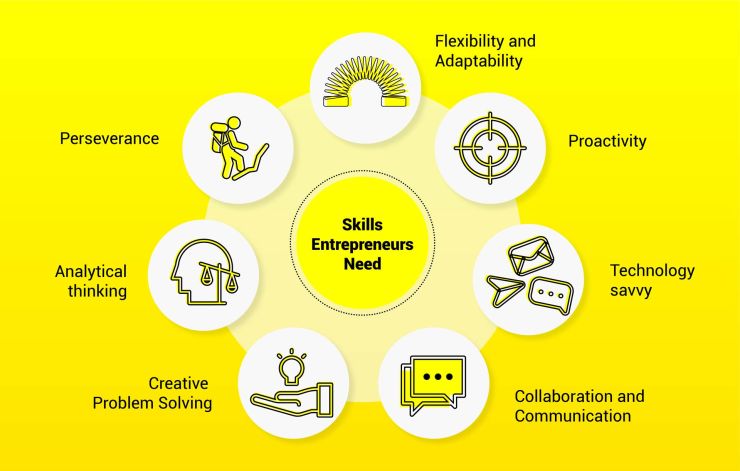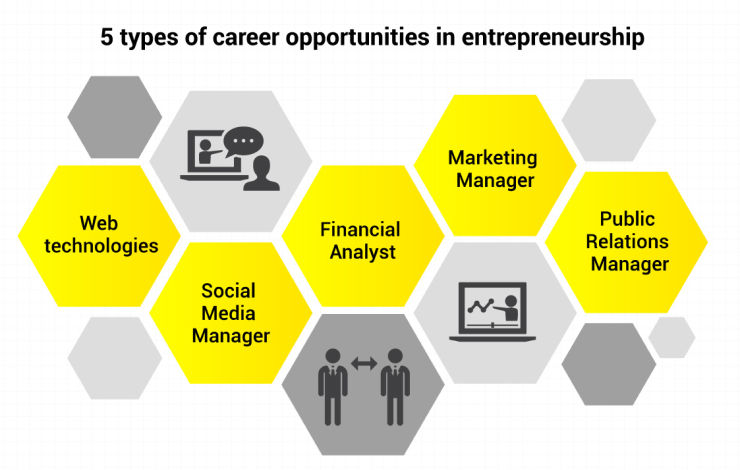
5 Best Job & Career Opportunities In Entrepreneurship
Entrepreneurship is one of the biggest driving forces in today’s economy. All across the world, but particularly in countries like Nigeria and the Philippines.
But what precisely are the job opportunities for entrepreneurship as a career? That’s exactly what we’ll be discussing below!
Each year there seem to be more and more aspiring entrepreneurs and intrapreneurs. But what are the job and career opportunities like for these people, and how does it impact on the worldwide economy.
Not only do startups promote economic growth, they also bring about social change and growth. In a country like the Philippines, entrepreneurial pursuits are in a position to shake up the current paradigm in industries and businesses. Entrepreneurship is now highly considered by the majority of the population as a good career option.
Although many would say that a University degree is not mandatory for entrepreneurship, attending a University, like Nexford to study a business administration degree (BBA or MBA), can be very helpful, as it teaches you soft skills like ownership, accountability, time management, prioritizing and emotional maturity. It also teaches you the business skills needed to succeed with your career goal, launch a successful new business, or both!
But of course, the Philippines is not just the only area of the world where the entrepreneurial spirit is alive and well. It's alive and well all over the USA, Europe, Africa and Asia.
In Nigeria, it is a way of starting a career and earning more as the lack of jobs and rise in poverty is forcing people’s hands. However, it’s not all doom and gloom, as statistics reveal that in Nigeria, startups and SMEs contribute 48% of national GDP, account for 96% of businesses and 84% of employment. According to the Nigeria Bureau of Statistics, SMEs in Nigeria have contributed about 48% of the national GDP in the last five years. With a total number of about 17.4 million, they account for about 50% of industrial jobs and nearly 90% of the manufacturing sector, in terms of number of enterprises.
No matter where you are in the world, entrepreneurship and startups are constantly creating new opportunities and career paths. But what careers can aspiring entrepreneurs pursue? Read on to find out more.
Why is entrepreneurship important?
In the Philippines, entrepreneurship is viewed as important to empowering the poor, enhancing production, and as an impetus to innovation. Entrepreneurship can provide the solution by creating wealth, jobs, and social empowerment. In the Philippines, 6.2% of the adult population are established business owners, and 18% are engaged in early-stage entrepreneurship (TEA). The country’s TEA rate is far higher than the average for Asia and Oceania (13%). 71% of Filipinos engaged in early-stage entrepreneurship are driven by the opportunity to improve their financial standing while only 29% are necessity-driven. In addition, nearly half (46%) of all Filipinos have a very positive view of the entrepreneurial opportunities in their country, furthermore, 66% believe that they have the entrepreneurial capabilities needed to start a business.

The stats clearly demonstrate that sustainable economic growth is a must for developing countries like the Philippines. Sustained growth is what gives each nation the means to create wealth and alleviate poverty. The main driver for this growth is innovation and increased production brought on by Entrepreneurship.
Entrepreneurship powers innovation
One of the key contributions of entrepreneurship is innovation. By definition, innovation is the act of putting ideas into practical use. This brings about new products or services or improves the already existing ones. This positively affects other areas including standards of living and productivity. As Joseph Schumpeter points out, innovation is a “constant and disruptive force” that is vital to a growing economy. Without this, entire economies grind to a halt.
Many economists believe that successful entrepreneurs have been the main driving force behind all this. Most of today’s advancement in major industries, from technological entrepreneurship and management jobs to space exploration, has been brought on by entrepreneurial endeavors.
Do you have the skills to be a successful entrepreneur?
Take our free quiz to measure your entrepreneurial skills and see if you have what it takes to run your own successful business.
Your results will help you identify key skill gaps you may have! Up for the challenge?
Economic growth
The introduction of new goods and services produces a chain reaction in related industries. A boom in a specific sector almost always guarantees a boom in related sectors. This sustains further development resulting in further growth. Likewise, new industries emerge which opens new possibilities. The new jobs generated by this continued progress are what improve the standard of living of the general population.
So what sectors in the Philippines are more dominant when it comes to entrepreneurship and helping to power the economy? 83% of entrepreneurs are in retail trade, hotels and restaurants, while only 3% are involved in the transformative sector – manufacturing, construction, and transportation. 4% are in agriculture, forestry, and fishing.
With their tendency to target previously untapped markets, entrepreneurs are in the position to generate new income and revenue streams. These emerging markets are what fuels wealth generation that further spurs the industries to grow.
Social Entrepreneurship - Community development and social change
As mentioned above, the innovations brought on by social entrepreneurs lead to improvements in the overall material well-being. Newer products and services have the potential to improve lives by being more efficient, effective, and affordable, unlike previous technologies. And entrepreneurship is seen by Philippine society as a very good means to improve one’s economic and social standing.
This improvement in standards of living empowers the communities to participate more in the economy’s growth. The entrepreneur’s personal and community-building tactic fosters a strong sense of belongingness within the community.
What skills make entrepreneurs successful?
As advancements in technology happen faster than ever, entrepreneurs must keep up with the demands. In a quickly expanding market like the Philippines, technical skills just won’t cut it anymore. What the industries need are soft skills that would allow one to flourish in today’s landscape. Here are 7 important skills that every entrepreneur should have.

Flexibility and Adaptability
These days, things are happening quickly all the time. Knowledge and processes are constantly written and rewritten. An entrepreneur should be able to quickly adapt to almost any situation. Gone are the days of rigid and static systems as the world adapts to a more open and dynamic work-life situation as brought on by the recent pandemic. Way back in 2011, Harvard Business Review published an article (paywall) about how adaptability was the “new competitive advantage.” Flash forward nine years, and resilience is beyond a trend.
Proactivity
To be adaptable and flexible to rapid changes, it is important to take an active role. Reactionary solutions are quickly out of date as clients become more nuanced. An entrepreneur should be able to provide effective solutions to client’s problems long before they realize it’s a problem. To be proactive also means to take the initiative in preparation for an imminent shift in the current landscape.
Technology savvy
This flexibility has been made possible through recent advancements in technology and infrastructure. Each day more and more businesses around the globe are moving towards the digital space. This is also opening new possibilities that were unreachable a few decades ago. As an entrepreneur, one should be savvy enough to navigate their way through this new era.
Collaboration and Communication
Now more than ever these two skills are tried and tested. According to data collected by Harvard Business Review over the past two decades, the time spent by managers and employees in collaborative activities has ballooned by 50% or more, and at some companies that figure sits at around the 80% mark. With the rise of remote working setups, being able to effectively and efficiently collaborate with teammates even across time zones is crucial. Effective collaboration and communication make reaching goals quicker and smoother for everyone involved. Location independence in the future and being an effective team player despite that is an asset.
Creative Problem Solving
As the popular saying goes “Modern problems require modern solutions”. An entrepreneur looking to thrive in today’s uber-competitive world needs to be able to approach problem-solving creatively. Thinking outside the box is now simply the new box. As the world advances, pumping out fresh and creative solutions is a highly sought after skill. According to a study by TalentSmart, 90% of top performers are able to manage their emotions successfully when they experience high levels of stress and this can contribute to better problem-solving. The answer is thus, ‘think clearly and you’ll build a more successful business’.
Analytical thinking
Overall, 58% of company leaders say analytics are important to their organizations now, and 82% say they will be important in five years. These days, data and information are at our fingertips. Not knowing what to do with these is a waste of potential. An entrepreneur should be able to use the data available and make sound decisions based on these. At the rise of Big Data, an entrepreneur should be able to expertly identify, analyze, and process information that is available
Perseverance
Finally, an entrepreneur wanting to succeed should be tenacious. The ability to persevere despite failures is a highly favorable skill. To be able to see things through to the end despite setbacks and hiccups is sometimes what spells a business’ success or failure.
Are you future-proof? Discover the future skills which can help you learn more to earn more
What education do entrepreneurs need?
The biggest names at the forefront of innovation these days are tech pioneers like Mark Zuckerberg, Steve Jobs, and Bill Gates. Often, aspiring entrepreneurs who look up to these three think pursuing higher education is optional or otherwise unnecessary. If they did it, so can we, right?
What people don’t realize is these pioneers are the exceptions. While they were brilliant in their own right, their success is a product of exceptional circumstances. Pursuing higher education is still the best course for people like us.
So, what education is needed to become an entrepreneur, and is a minor in entrepreneurship worth it? While a degree or even a minor in business or entrepreneurship might not have a direct effect on your business’ success, any bit of formal knowledge in the field of business and entrepreneurship can mean a lot.
There are many things needed in launching and running a business. From understanding business law, handling finances and finding investors, to managing people. Though these things can be learned hands-on, having the right training beforehand can tremendously help you get a good jumpstart. The training you receive while studying can help you be prepared for what to expect as well as get a good grasp of your business.
Why entrepreneurs still need to get higher education (despite some buzz otherwise)
Here are a few courses to consider:
Business
This seems like a no-brainer to some but it bears repeating. Having a business degree like a BBA or MBA gives you the essential skills to turn an idea or side hustle into a viable business. It introduces you to a thousand years worth of business knowledge, from theories and legal requirements to future skills and best practices. This also lets you understand exactly what a business needs to grow and prosper. This is the number one choice for most aspiring entrepreneurs.
Marketing
Knowing how to attract and persuade clients is the lifeline of every business. Without clients, your business is as good as lost. That is why some aspiring business people choose to get a degree in Marketing. This degree will help you become competitive and relevant. This will also help you understand how to reach your target audience effectively. A good choice if you want to focus on attracting people and building a community.
Do you have the skills to be a successful entrepreneur?
Take our free quiz to measure your entrepreneurial skills and see if you have what it takes to run your own successful business.
Your results will help you identify key skill gaps you may have! Up for the challenge?
Computer Science
The Tech industry is at the forefront of innovation these days. Having a solid background in computer science lets you leverage this. You get to be at the cutting edge creating new solutions for today’s problems. We offer MBAs in both Cybersecurity and AI. Having a tech background also lets you get a good grasp of current technologies and how to use them to your advantage.
Communications
As stated above, effective communication skills are vital in running a business. Being able to effectively connect with others—whether clients, potential partners, or investors—positively affects your growth. Having a degree in Communications helps you hone these skills as well as learn effective techniques. This is a great foundation if you want to focus on fostering and strengthening connections.
Tech Startups
Finally, what better way to learn about launching and running your startup than a degree in Entrepreneurship. This degree will prepare you for the intricacies of keeping your startup relevant and competitive. Getting a startup off the ground takes a lot of hard work and sound decisions. Having the background and training for this, specifically, is valuable. Degrees/certificates in Entrepreneurship-related studies grew by 572% between 1995 and 2013 and that figure has nearly doubled in 2021.
Looking To Develop Your Entrepreneurship Skills?
Discover how you can acquire the most in-demand skills with our free report, and open the doors to a successful career. Download the free report today!
Looking to potentially take your career even further? Consider how an Online BBA, Online MBA or Online MS can help you develop these skills and increase your earning potential.
If you'd like to take the first step toward an entrepreneurial career, or are already on the journey and need the skills to take your business to the next level, a great place to start is with Nexford's BBA in Entrepreneurship and our MS in Entrepreneurship.
Career Opportunities In Entrepreneurship - Top 5
Entrepreneurs have the unique opportunity to be able to pursue their careers in almost any field. Jobs for entrepreneurs range from marketing or finance to tech and social media. The possibilities are endless! If you are an up-and-coming entrepreneur working on striving to turn your entrepreneur job ideas into a reality, here are some career paths you can pursue.

1. Web technologies
The growth of the Internet has exploded with sales estimated to be over $4 trillion by 2021, meaning that potential jobs for entrepreneurs in web technologies are booming. The significant growth of mobile technology, social apps, and the cloud has created opportunities for potential online entrepreneurs to enter the world of technology entrepreneurship at a low cost. As the internet grows each year, many companies are now transitioning their businesses online. From big retailers to small mom-and-pop shops, everyone is starting to realize the potential of an online presence. As a web technology expert, it is your job to help these businesses reach this goal through web development. Your entrepreneur job will include creating things such as landing pages, websites, and even online stores for your clients.
2. Social Media Manager
Entrepreneur jobs ideas aren’t just limited to traditional sectors. Recent trends on the internet have proven the concept that social media is an excellent way to boost sales and raise brand awareness. 70% of consumers say it’s important for brands to take a stand on social, and 66% of that group say it’s because they believe brands can create real change. Behind those brands taking a stand are the social media managers crafting the messaging, fielding the feedback both good and bad, and answering hard questions. Therefore, social media is undeniably a huge pool of resources for businesses these days. Leveraging this allows you to tap into millions of potential customers worldwide. That is why businesses are investing in creating and maintaining a social media presence. Social Media Managers, help these companies manage and market their brands on these platforms.
3. Financial Analyst
The following entrepreneurial careers follow the traditional set of careers for business majors. A Financial Analyst helps individuals and companies in assessing, managing, and planning financial goals, is arguably one of the best jobs for business majors in terms of potential income.
They help their clients make good financial decisions that fit their needs. They also help manage things like investment portfolios as well as help in making business plans. If you love helping others by managing their finances, this is the career path for you. The U.S. Bureau of Labor Statistics (BLS) expects 5% job growth for financial analysts from 2019 to 2029, as fast as expected job growth for all occupations.
Do you have the skills to be a successful entrepreneur?
Take our free quiz to measure your entrepreneurial skills and see if you have what it takes to run your own successful business.
Your results will help you identify key skill gaps you may have! Up for the challenge?
4. Marketing Manager
If your interests lie in planning and implementing marketing strategies, this is the entrepreneurship career path for you. Marketing managers oversee the entirety of the marketing side of the business. From conceptualization, planning, to implementation. They are responsible for leading the team in attracting potential new clients into the business. The Bureau of Labor Statistics reports that employment of marketing managers is set to grow 9% by 2024, which is faster than the average for all occupations. This growth is due to the increased use of social media and internet marketing. The average salary for a marketing manager is $128,750 a year, which is higher than advertising and promotions managers.
5. Public Relations Manager
How the public sees the business will greatly impact how it will perform. It is the Public Relations Manager or PR to manage and improve the business’ image. This is done through media communications, public events, charity work, etc. If you like working in improving and maintaining a company’s image and reputation, this is the career field for you. Especially when you consider that the employment of public relations and fundraising managers is projected to grow by more than 9% from 2019 to 2029, much faster than the average for all occupations.
How much do entrepreneurs make?
This is the million-dollar question that is in the minds of every aspiring self-employed business person: how much money do entrepreneurs make? What exactly is an entrepreneur’s salary range?
Alas, there is no definitive figure anyone can expect to earn when pursuing their entrepreneurial ambitions. Some people can make six figures in a year or less, while others will have to work day and night for years on end to make half that amount.
However, the average entrepreneur salary, if you consider SMEs in the United States, is between $68,000 and $72,000 annually. And if you look at entrepreneurship graduates from 2015-2017, the entrepreneurship major salary is quite low in comparison. Considering the median salary of a financial analyst was $81,730 in 2021, the entrepreneurship salary range is substantially lower.
That’s not to say that becoming an entrepreneur or earning a degree in entrepreneurship isn’t worth it. In fact, some brilliant business ideas can generate millions, if not billions, in funding.
That said, an SME owner with a degree, the aforementioned entrepreneurship jobs salary is only a starting point. As described earlier, there’s huge potential to make more money, especially if you stick to an industry that you’re passionate about and continue to learn about. In fact, the higher your degree, the more your entrepreneurship degree salary will increase. Plus, there’s the fact that you can impress potential investors with a bachelor’s or master’s degree in the field.
So, the entrepreneur’s salary can be a bit concerning at first, but if you dive into the business world, this is inevitable. Over time, as you hone your skills, learn the ins and outs of your industry, establish networks and grow your business, it’s entirely possible that your entrepreneur job salary can skyrocket.
Are you ready for a career in entrepreneurship?
If a career in entrepreneurship is sounding more and more appealing, then Nexford is here to help.
Take our free quiz to measure your entrepreneurial skills and see if you have what it takes. Your results will help you identify key skill gaps you may have and set you on track. Take the quiz now!
Looking to potentially take your career even further? Consider how an Online BBA, Online MBA or Online MS can help you develop these skills and increase your earning potential.
If you'd like to take the first step toward an entrepreneurial career, or are already on the journey and need the skills to take your business to the next level, a great place to start is with Nexford's BBA in Entrepreneurship and our MS in Entrepreneurship.

Mark is a college graduate with Honours in Copywriting. He is the Content Marketing Manager at Nexford, creating engaging, thought-provoking, and action-oriented content.
Join our newsletter and be the first to receive news about our programs, events and articles.